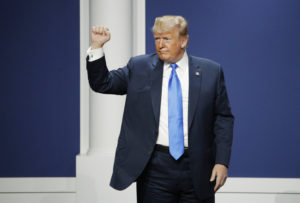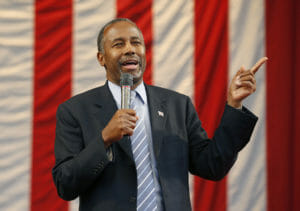The American Hunger Games
Let’s send the six Republican candidates for the presidency into the wilderness, weapons in hand, one at a time, and examine their minor differences to see what we can expect in a coming Republican era of “good times.” Kendra Miller / CC BY-ND 2.0
1
2
3
4
Kendra Miller / CC BY-ND 2.0
1
2
3
4
Fact: too many Republican candidates are clogging the political scene. Perhaps what’s needed is an American Hunger Games to cut the field to size. Each candidate could enter the wilderness with one weapon and one undocumented worker and see who wins. Unlike in the fictional Hunger Games for which contestants were plucked from 13 struggling, drab districts in the dystopian country of Panem, in the GOP version, everyone already lives in the Capitol. (Okay, Marco Rubio lives just outside it but is about to enter, and Donald Trump like some gilded President Snow inhabits a universe all his own with accommodations and ego to match.)
The six candidates chosen here (based on composite polling) have remarkably similar, unoriginal, inequality-inducing, trickle-down economic recommendations for the country: reduce taxes (mostly on those who don’t need it), “grow” the economy like a sprouting weed, balance the budget by cutting as yet not-delineated social programs, overthrow Obama’s health-care legacy without breaking up the insurance companies, and (yawn)… well, you get the idea. If these six contenders were indeed Hunger Games tributes, their skills in the American political wilderness would run this way: Ben Carson inspires confusion; Marco Rubio conveys exaggerated humility; Ted Cruz exudes scorn; Jeb Bush can obliterate his personality at a whim; and Carly Fiorina’s sternness could slice granite. This leaves Donald Trump, endowed with the ultimate skill: self-promotion. As a tribute, he claims to believe that all our problems stem from China and Mexico, as well as Muslim terrorists and refugees (more or less the same thing, of course), and at present he’s leading the Games.
When it comes to economic policy, it seems as if none of them will ever make it out of the Capitol and into the actual world of American reality. Like Hillary Clinton, blessed by Wall Street’s apparently undying gratitude for her 9/11 heroism, none of the Republican contestants have outlined a plan of any sort to deal with, no less break the financial stronghold of the big banks on our world or reduce disproportionate corporate power over the economy, though in a crisis Cruz would “absolutely not” bail them out again. Stumbling around in the wilderness, Carson at least offered a series of disjointed, semi-incomprehensible financial suggestions during the last Republican “debate,” when asked why he wouldn’t break banks up. “I don’t want to go in and tear anybody down,” he said. “I mean that doesn’t help us, but what does help us is to stop tinkering around the edges and fix the problem.”
Rubio, already in top Hunger Games form, swears that it’s recent regulations (not legacy elite decisions) that did the dirty deed. “The government made [the banks] big by adding thousands and thousands of pages of regulations,” he said of Dodd-Frank legislation (which doesn’t actually alter Wall Street structurally in any way). In fact, in recent decades every major power grab or consolidation in American business, from banks to energy companies, resulted from bipartisan deregulation.
None of these big-money-backed candidates seem particularly concerned that another economic crisis could ever cripple the country, or have evidently even noticed that most Americans have yet to experience the present “recovery.” None seem to realize that when the Federal Reserve winds down its cheap money policy and banks and companies are left to fend for themselves, more economic hell could break loose in the style of the 2007-2008 meltdown. Jeb Bush recently summed up the general 2016 Republican position on the economy in a single what-me-worry-style sentence: “We shouldn’t have another financial crisis.” ‘Nuff said.
In the 2012 presidential election, Mitt Romney’s chances dwindled after he disparaged 47% of the country as so many leeches. Today’s Hunger Gamers have learned from his experience. Optics spell opportunity, so as a group they’re shuffling the usual Republican-brand tax cuts for corporations and the wealthy in with selective recognition of the broader population and promises to kill all loopholes in some future utopian tax bill. None of them, of course, would consider raising the minimum wage to put more money in the pockets of workers before tax-time hits. Even old Henry Ford knew the power of wages when, early in the last century, he strengthened his car empire by doubling the then-prevailing minimum wage for his workers to $5 a day — enough for them not only to save up and buy his Model-Ts, but also boost productivity.
The present set of Hunger Gamers could invoke Republican President Teddy Roosevelt’s trust-busting ire, or President Dwight D. Eisenhower’s willingness to fund vast national construction projects, or even (to reach into the distant past) President Herbert Hoover’s initial attempts to pass what became, under Democrat Franklin Delano Roosevelt, the 1933 Glass-Steagall Act that separated deposit-taking from speculation at banks. But to be realistic, none of them belong to the Republican Party as it once existed. They all live in an American Panem and so feel no compunctions about promoting the idea that corporations contributing ever less to the federal till would Make America Great Again.
Now, let’s send those six candidates into that wilderness, weapons in hand, one at a time, and while we’re at it, examine their minor differences by checking out their campaign websites to see what kind of games we can expect in a coming Republican era of “good times.”
Ben Carson
If you look through the index of Ben Carson’s latest bestseller, A More Perfect Union, you won’t even find the words “economy,” “banks,” or “Wall Street.” Instead, his campaign slogan, “Heal, Inspire, Revive,” could headline a yoga retreat. His position as the Republican co-frontrunner or runner-up (depending on which polls you look at) relies on his soft-spoken, non-politician persona, not his vague economic ideas that flash by in a chameleon-like fashion.
Your support matters…Independent journalism is under threat and overshadowed by heavily funded mainstream media.
You can help level the playing field. Become a member.
Your tax-deductible contribution keeps us digging beneath the headlines to give you thought-provoking, investigative reporting and analysis that unearths what's really happening- without compromise.
Give today to support our courageous, independent journalists.






You need to be a supporter to comment.
There are currently no responses to this article.
Be the first to respond.